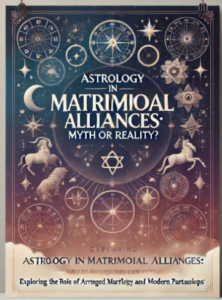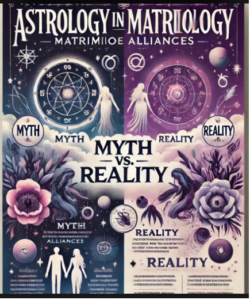Astrology has played a prominent role in arranged marriages, especially in cultures where marriage is viewed as a union that extends beyond two people to their families and destinies. For centuries, astrological compatibility has been a key criterion in matchmaking, but opinions on its validity vary widely. Some see it as a practical tool rooted in tradition, while others dismiss it as pseudoscience. This blog will explore both perspectives, addressing the underlying beliefs, the mechanics of astrological compatibility, and the evolving perceptions of astrology in modern marriages.
The Beliefs Behind Astrological Compatibility
Astrology is based on the idea that celestial bodies, particularly planets and stars, can influence human lives, personalities, and destinies. In the context of marriage, astrology is used to predict how harmonious, supportive, and prosperous a relationship will be. Astrologers create birth charts, or “kundalis,” to understand the personality traits, life paths, and potential challenges of each individual. A well-matched horoscope is thought to bring stability, while mismatched horoscopes are believed to foreshadow discord or misfortune.
Key Astrological Concepts in Matrimonial Alliances
Some of the primary factors that astrologers consider include:
- Guna Milan (Compatibility Points): In Hindu astrology, 36 points are used to measure compatibility. The higher the score, the greater the marital harmony. These points are based on factors like temperament, health, family background, and other areas that influence compatibility.
- Manglik Dosh (Mars Affliction): An important consideration, particularly in Indian astrology, is the Manglik Dosha, which is present if Mars is in certain houses. It’s believed that Manglik individuals may face marital issues if paired with non-Mangliks, leading to divorce, health problems, or even the death of a partner. Astrologers recommend Manglik-Manglik matches or certain rituals to “nullify” the Dosha.
- Navamsa Chart (The D9 Chart): This is a more nuanced chart that delves deeper into marriage compatibility, focusing on the “soul” of the marriage, not just compatibility at face value.
The Argument: Astrology as a Practical Tool
Proponents argue that astrology offers a structured, intuitive system that addresses intangible aspects of compatibility beyond personality traits, such as future prosperity, children, and family dynamics. Many cultures view marriage as a sacred bond that requires alignment of values, goals, and destiny, not just personal connection. In societies where families arrange marriages, astrology also serves as a psychological assurance that the union will have a cosmic blessing.
Astrological compatibility can also provide guidance on potential areas of friction and how to overcome them. This might help couples navigate the complex dynamics of a marriage. Furthermore, astrology may promote self-awareness, helping individuals understand their personalities and predispositions better.
The Counter-Argument: Astrology as Myth
Sceptics see astrology as largely mythological. They argue that astrology lacks scientific backing and that no causal relationship has been established between celestial bodies and human relationships. Research on astrology is limited, and modern studies do not support claims that horoscopes can reliably predict relationship success.
Critics also argue that focusing heavily on astrological charts can overshadow practical relationship factors, like communication, values, and shared goals. Compatibility ultimately depends on the individuals and their choices, not planetary alignments. In fact, the strict adherence to astrological beliefs can sometimes limit personal freedom, making people feel pressured to choose partners based on charts rather than genuine connections. For many young people, especially those raised in modern, multicultural environments, compatibility now centres around lifestyle, interests, and mutual understanding rather than birth charts.
The Modern Middle Ground: Astrology as a Cultural Symbol
While some people still adhere to traditional astrological beliefs, a growing number approach astrology as symbolic rather than literal. For them, it’s a cultural tradition that offers comfort and a sense of continuity with their heritage. They may incorporate astrology into the marriage process as a nod to their cultural roots but prioritise compatibility factors rooted in personal connection and shared values.

Conclusion: Myth or Reality?
The role of astrology in matrimonial alliances can be seen as both myth and reality, depending on one’s perspective. For those who believe, astrology offers comfort, structure, and meaning in a complex decision. For those who don’t, it remains a relic of outdated beliefs that may limit the scope of genuine relationships. In the end, the decision to use astrology is deeply personal and culturally rooted.
Today, many couples are blending astrological traditions with modern compatibility assessments, bridging cultural beliefs with contemporary values. Whether you view it as myth or reality, astrology’s role in marriage continues to evolve, reflecting the broader, changing landscape of arranged and love-based marriages alike.
